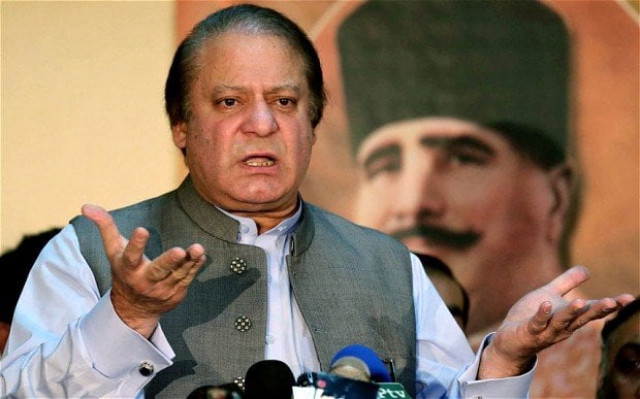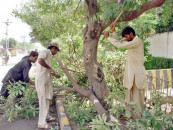Whether PM truthful is key issue: top court
Justice Asif Saeed Khosa says real issue is whether PM is truthful in his statements regarding London properties

Prime Minister Nawaz Sharif. PHOTO: AFP
Hearing the Panamagate case on Monday, Justice Asif Saeed Khosa – head of the Supreme Court’s five-judge larger bench – observed that the real issue before the court is whether the prime minister is truthful or not in his statements related to his family’s London properties.
Panamagate case: SC seeks timeline of Nawaz’s public offices

“The real issue before us is honesty. Was he (PM) honest to the nation, the National Assembly and the court?” asked Justice Khosa in his remarks when PTI’s counsel Naeem Bukhari referred to contradictions in the PM’s speeches in National Assembly on the money trail of the London flats. “There are some contradictions in the explanations, given by the PM and his children,” Justice Khosa observed.
Another member of the bench, Justice Azmat Saeed Sheikh observed that Articles 62 and 63 was not applicable to the PM alone but also to all parliamentarians and if the court started disqualifying the lawmakers on the basis of misstatements then no one would survive.
“That’s why we are very much careful as we are not in a rush in this matter. We know the gravity of the declaration in this matter,” Justice Khosa added. He hinted at setting parameters for future on the applicability of constitutional requirement for a lawmaker to be Sadiq [truthful] and Ameen [trustworthy].
Speaking on the issue on a lighter note, Justice Khosa observed they would not set a standard that no lawmaker except Jamaat-e-Islami Amir Sirajul Haq could pass. He however told the PTI’s counsel that the researchers in the SC were already working on this matter.
Hudaibiya Paper Mills
During the hearing, the bench discussed Rs620 million Hudybia Papers Mills case, wherein the National Accountability Bureau (NAB) did not file an appeal against the Lahore High Court’s (LHC) March 2014 verdict for quashing a reference against Sharif family as well as Finance Minister Ishaq Dar.
The reference was made by NAB on the confessional written statement Ishaq Dar gave before a magistrate back on April 25, 2000 during the era of military ruler Gen Pervez Musharraf. The statement said Sharif brothers used the Hudaibya Paper Mills as a cover for money laundering during the late 1990s.
Justice Khosa observed that there were a lot of details in the confessional statement but no investigation agency had probed into the matter. Justice Ejaz Afzal Khan remarked that the SC could not sit in judgment as they are appellant authority.
Make-or-break day for PTI in top court
However, Justice Khosa observed that when NAB did not move an appeal against the LHC order in the case of former Oil and Gas Regulatory Authority (Ogra) chairman Tauqir Sadiq, the Supreme Court while exercising Article 184 (3) of the Constitution accepted that appeal.
He also said the SC may pass an order for filing appeal in view of Article 187 of the Constitution for complete justice. The judge, however, expressed wonder as to what were the reasons behind not filing appeal against the high court order in Hudaibya Paper Mills.
He also questioned if a fresh reference could be filed in this matter or not. Likewise, the bench also asked whether the court could ask for the reinvestigation of any case, whose reference was quashed.
“If we feel then we may direct NAB chairman to file an appeal against the LHC’s verdict,” he added.
Justice Khosa told the PTI’s counsel that different things have jumped together in their petition as London flats controversy and Hudaibya Paper Mills case were separate issues. “Whether you want the court to deal with both matters separately?” he asked the PTI lawyer.
Poor show of PTI attorney
Despite having significant documents, Naeem Bokhari once again seemingly struggled to substantiate the PTI’s case in verbal arguments. The PTI chief Imran Khan, who was present in the courtroom, was visibly upset over the performance of his counsel.
The PTI leaders also admitted that their counsel could not cite any judgment to substantiate the legal questions, raised by the bench. Once Justice Azmat also told the PTI’s counsel that the bench raised around one dozen questions but he did not give their answers.
“You did not submit any scrap of paper to establish that Sharif family owned London properties in 1993,” he also said in his remarks.
SC grills PTI lawyer over failure to prove allegations against Sharifs
Likewise, Justice Ejaz Afzal Khan observed that the entire business was done by the late Mian Sharif [the PM’s father] and now whether it was the responsibility of PM and his children to prove the money trail. “You cannot presume that money was sent by PM,” he said.
However, Justice Khosa said there were three stories about the origin of the London properties. “One [story begins from] Dubai, second from Qatar and the third from Juddah and all of them end up in London,” he said. “It was the money of late Mian Sharif, which was transferred from Dubai to other countries and the PM had some part of that amount and now he has to give the answer.”
Bukhari said the PM’s daughter, Maryam Nawaz, was dependent on him as her husband had no income, adding that even he had no income tax number before becoming a member of National Assembly.
He also submitted detail of millions of rupees, which were given to Maryam by her father (Nawaz Sharif) and her brother (Hussain Nawaz) as gift.
Regarding the trust deed of Sharif family, Justice Khosa observed that the PM and his children in their interview did not allude to Qatari investment as well as trust deed.
Justice Azmat observed that it is for them (respondents’ counsels) to explain why they are hiding the record from the court. The bench also observed that the record of how the PM’s son started business should have been shown by respondents.
He observed that if the Qatari letter was excluded in this matter then there would be a vacuum. “Your case is that the trust deed was created by the Sharif family to prove the money trail in the court,” he told the PTI counsel.
Though Bukhari wanted to wind up his arguments, the bench gave him another opportunity to bring more records to prove his submissions.
Published in The Express Tribune, January 10th, 2017.


















COMMENTS
Comments are moderated and generally will be posted if they are on-topic and not abusive.
For more information, please see our Comments FAQ